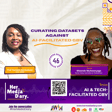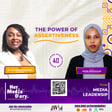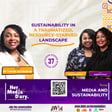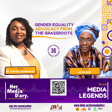Become a Creator today!Start creating today - Share your story with the world!
Start for free
00:00:00
00:00:01

Mental Health of Journalists
In this episode, we speak about the mental health of journalists and duty of care of editors and senior management in news organisations, to journalists.
Dr Yemisi Akinbobola, is joined by Qaanitah Hunter, Politics Editor at South Africa's News24, and Stephanie Busari, Editor at CNN Africa.
Transcript
Introduction & Guests
00:00:00
Speaker
Hello everybody and welcome to the fourth episode of our podcast series COVID-19 for journalists. My name is Dr. Yamasi Akimobola and I'm the co-founder of African Women in Media. In this episode, we are speaking about mental health of journalists covering COVID-19 and other pandemics.
00:00:20
Speaker
and I'm joined
Quenita's Experience in Journalism
00:00:21
Speaker
by two African women who are in leadership positions in news organizations, both News24 and CNN International. Stephanie and Quenita, thank you very much for joining us. Would you like to introduce yourself and tell us something interesting about you? Shall we start with Quenita? Thank you very much. I am the very newly appointed Politics Editor of News24. I am yet to start my role, but I've previously worked as a political reporter
00:00:50
Speaker
at the Sunday Times in Johannesburg and other media houses over the years, including the Men and Guardian in the Daily Maverick. Last year, I published a book on South Africa's President Salarama poster called Balance of Power.
00:01:04
Speaker
Brilliant, that sounds great. Stephanie, how about you? Would you like to introduce yourself and tell us something interesting about you? My name is Stephanie Bussari and I head of CNN's Bureau in Lagos, Nigeria. I moved here in 2016 to take up the role. I also edit CNN Africa Digital. A fun fact about me is that when I was a little girl growing up in Nigeria, I had a pet monkey.
00:01:27
Speaker
So
Mental Health & Media Freedom
00:01:28
Speaker
ladies, today we're talking about mental health of journalists who are covering COVID-19, but also just understanding what we mean by mental health in the context of journalism practice itself, because we all are affected by mental health at some point in our lives, irrespective of our career. So how would you describe mental health in the context of journalism practice? I think that
00:01:55
Speaker
Mental health for journalists is explicitly linked to media freedom. And I say this because what happens is that things that affect our daily work affect our mental health. And as a result, it then poses an impact on media freedom because when there is intimidation, when there's harassment, when there's
00:02:18
Speaker
you know, censoring of journalists in a way that fundamentally impacts their mental health, whether it's causing anxiety or depression, or many of the other mental health illnesses, you see a growing level of self-censorship. And so I think that the two issues are absolutely linked to each other. And that's why I feel like while
00:02:39
Speaker
community in general, the world in general, needs to have conversations around mental health. There needs to be a specific and targeted conversation around mental health in journalism, particularly because it was something that was ignored for so many years, despite the red flags that it actually does have an impact on journalists and journalism. And it's quite interesting how you connect it with media freedom. Could you say a bit more about that?
00:03:07
Speaker
For my lived experience in South Africa working as a political reporter, I used myself as an example to start speaking about this and then mobilizing other people to share their stories. And I found that with my experience, it was a growing level of online harassment, intimidation from the people I was writing about that affected my own anxiety and caused a level of depression that saw me go and seek help and see a therapist.
00:03:35
Speaker
But what I found going through that time is that I reached a stage I was almost afraid because of how I felt and because of the anxiety that I felt to pursue certain stories implicating certain political parties, for example, because I knew how that would then affect my anxiety and my depression. And so it's almost this vicious circle. And I think that if it's not adequately addressed, you will have a case
00:04:01
Speaker
We're more and more journalists, self-sensor, where you have more and more journalists walking away from doing the critical stories that are necessary because of the impact that it has on mental health. The other issue is that because mental health is not spoken about so openly in newsrooms, many journalists walk around, whether it's with depression, whether it's with anxiety, whether it's with other illnesses.
00:04:25
Speaker
or just with the symptoms of mental health illnesses or just bad state of mind and without the necessary tools or knowledge to know that actually this is having a devastating impact. My work is having a devastating impact in my life and this is how I can seek help for it. And I think that it leads to a number of things. The high turnaround of journalists, people leaving the industry,
00:04:52
Speaker
young journalists, especially leaving the industry because their inability to cope, the impact on journalists' personal lives, so then adopting bad habits, you know, almost quite normal when it comes to, you know, society more broadly, but because of the high impact of the stress level in which we operate, and I talk about, you know, in a South African and African context,
00:05:14
Speaker
There isn't enough guidance in to say that journalists who may have covered minors being shut down in close range will need a lot of support by the newsroom so that they're able to not only function in their jobs, but function in their lives. And then the last point
Journalism Culture & Mental Health
00:05:33
Speaker
that I want to make about this is that the bravado that comes with journalism is almost the antithesis of ensuring good mental hygiene.
00:05:41
Speaker
So what happens is it's instilled in young journalists that we are almost invincible. I like to call it the savior complex, where journalists believe that the normal things that affect other people, we almost exempt to it because we have this broader role or this bigger service or this sort of bigger calling. And so what happens is we underestimate the impact
00:06:10
Speaker
of normal, everyday challenges. So whether it's PTSD, post-traumatic stress disorder, whether it's anxiety, whether it's depression, which is very normal for people to experience in life, we believe that that does not affect us.
00:06:27
Speaker
despite the fact that our working environment almost perpetuates bad mental health because of the various factors of what we do and the impacts that we face. There's a lot of bravery associated with the work that journalists do and we kind of almost underestimate the impact of that to the human who is the journalist and also
00:06:52
Speaker
As you said, there's a lot of things that we see that there is that duty of care that we have to journalists to make sure there's a way for them to decompress in a way. Stephanie, I'm going to bring you in to offer your perspective on how you would describe mental health in the context of journalism practice.
00:07:13
Speaker
critical because we are at the front line but we're not front line workers in a very strange sense. Often in our reporting you'll find that journalists alongside rescue workers or you know security services are the ones running into a disaster zone whilst other people are running out.
00:07:34
Speaker
So, you know, we kind of put ourselves at risk a lot of times, you know, in the course of doing our jobs, be it in war reporting, be it in covering disasters or whatever breaking news is happening at that time. So we need to kind of
00:07:50
Speaker
prioritise our mental health, you know, these things take a toll. My organisation does offer professional services that you can call and that you can also talk to, you know, in the aftermath of very, very traumatic reporting or anything, you know, there's a lot of support. And that's important, I think, as employers, as leaders for us to think about how to
00:08:13
Speaker
support our teams when they are faced with these reporting that is quite disgusting at times. I mean, it's
COVID-19's Impact on Journalists
00:08:22
Speaker
our job, that's what we do. We bring distressing images and put it in context and make sense of it for our readers, our viewers, all of these things, but it takes great personal toll and it's important to have that support in place.
00:08:36
Speaker
I mean, picking up on what both of you said about journalists seeing themselves as kind of immune to the impact of the things that we witnessed. Right now, the world is going through a pandemic, COVID-19, journalists at the front line reporting on this, both in terms of the human stories, but also in terms of managing scientific, governmental information and how to kind of relay that back to the citizens, to the audiences. Now, these are journalists, yes, they have a job to do, but they're also the humans.
00:09:06
Speaker
They're also human. And both of you manage journalists in your newsroom as leaders in your news organisations. Are there any specific mental health impacts that the coverage of the journalists that you supervise on COVID-19 is having? What kind of mental health impacts are you witnessing or that you're seeing emerge from the journalists that you're working with? We're all living pretty much the same experience in varying degrees. So it's hard for us
00:09:34
Speaker
to say that as journalists, we're not going to detect ourselves or be affected. And what I've told my journalists and my team is that this is not business as usual. We're not just kind of working at home, having a jolly or whatever, you know, we're working through a crisis. And so it's okay.
00:09:53
Speaker
not to be okay to use that well-worn phrase. It's okay, really, not to be okay. We're facing challenges on multiple fronts. We're working from homes in place, quite frankly, where the infrastructure is not set up to enable us to work optimally from home, because tech issues, because of issues to deal with power, generation, electricity, et cetera. So I just really,
00:10:24
Speaker
tell them all the time that it's fine, we do what we can, you know, we're just going to get through this time. And they know that they have a lot of support from me as a leader, and they know that they can take time off. And that is actually what is the process more than even the work is the emotional wellbeing. And also at the same time, they are, their friends, their family members are going to be affected by COVID, you know, because the nature of the pandemic is that
00:10:53
Speaker
the virus is spreading and you know it's been hit on multiple points and multiple fronts and trying to manage all of this and also being like colleagues or parents working from home managing their children's education so all of these things really equate to one of the most stressful times we will ever face in our working professional lives as people so the message that I always always try to
00:11:22
Speaker
put across to them is to remember that, and that emotional wellbeing is very much more important than any work that we'll ever produce right now. In the second episode of this podcast series, one of our guests was a Ugandan journalist, Colton Dovia,
00:11:42
Speaker
And she spoke about, because she's out in the field, because she's in the population, filming human stories around COVID-19, being contacted, people who are affected, who are being infected, she's now having to not go home. So she's having to stay away from her family and live by herself in order for enough to affect or infect her family members. So there's a whole kind of mental toll that must have on somebody like her having to make those kind of
00:12:12
Speaker
big changes in their lifestyle.
00:12:14
Speaker
How about you, Konita, how things in South Africa with the journalists that you work with in terms of journalists covering COVID-19? Just a small observation before I answer your question is that we are so attuned to very violent or very traumatic, visibly traumatic scenes in our reportage, right? So something like the coronavirus, where you can't physically feel that there's something happening, where there isn't bodies lying
Balancing Work & Personal Life
00:12:41
Speaker
on the ground,
00:12:42
Speaker
And so there's almost this feeling or this contradiction that you should be okay because it's not as bad as the time you saw dead bodies lying around or whatever the case may be. And so what happens is there's an effort to diminish the impact that this is actually having on us.
00:13:02
Speaker
And I think that for me, what Stephanie was saying about just saying, it's okay, it's okay to feel this way because you not, for the first time, journalists are immersed in the very same story that we are covering. We are experiencing the exact consequences of what we are now having to report on. And so I think that having these discussions, firstly, it's a safe environment for people to start talking about it.
00:13:31
Speaker
What I have done was that journalists that I know that have been having a bit of a hard time keeping in contact with them away from work. So whether it's just conversations via text or calls and to also create boundaries around work. And it's a very difficult thing because
00:13:48
Speaker
It's almost unheard of where you say journalism ends and you go home because the nature of our job is that, and especially now with technology, is that there isn't a nine to five day anymore. And Stephanie may attest to that, is that your life and your job is one. And so what happens is that there isn't healthy boundaries in place with journalists and where we could just have time off to relax and do other things.
00:14:15
Speaker
because there's this constant chatter and noise of the news that's continue happening in your day. And so what I decided to do.
00:14:25
Speaker
was to reach out to journalists who I know have been having a hard time and to create some sort of good relationship away from work. And I think that has helped for me in this time as well as people that I've reached out to. And I think that just communication from those in higher office or with its editors or or proprietors of a news organization to constantly talk about the willingness or the openness in
00:14:52
Speaker
accepting and appreciating the impact of working during this time. So not only saying, hey guys, here's a psychologist that you can reach out to, which is also very rare in many newsrooms, and Stephanie, you were very lucky that you have that kind of sport, but also to just to foster this okayness and foster this awareness that it is fine to have a bad day. It is fine
00:15:21
Speaker
to not be able to work from 10am to 10pm. Also to create conversations.
00:15:27
Speaker
that are not formal, as in, you know, a human resource processing, here's the protocol of how, you know, when you're feeling low, but almost to create it organically in relationships and reporting lines, that journalists not only can feel okay by sharing what they're going through, but also to equip them to see red flags, because often we don't really appreciate what we're going through until it's too late.
00:15:54
Speaker
Thank you, Quinnica. I think you're speaking a lot there about the duty of care that senior management and media organizations should have. So what are some of the strategies that you're putting in place in your organization? I think it's a bit early in that regard because I've literally just joined a new organization.
00:16:12
Speaker
just speaking from experience and what I've had in my previous place of employee was to create open lines of communication, to have resources available that if journalists need
00:16:25
Speaker
to access therapy or any help that they cannot afford to do in their own medical plans that the company can then provide for them. The third of which is to understand that this is obviously a very lonely time for many people. At the same time, everyone's going through their own personal issues. So trying to put strong boundaries in place so that
00:16:46
Speaker
respecting of people's personal life I think that's going to be the biggest challenge of the COVID-19 reporting and that I think is something that as a news manager you're able to then take the lead in and enforce that if it's you know that there's time at work and there's time at home and there's a separation even if you are working from home. What I find most difficult is I mean I'm home right now as my three kids we're family of five
00:17:12
Speaker
I'm just having that I've had to work what my work day looks like. I'm literally have sometimes I'm working late at night and that's my work day. You know, sometimes I'm having to work early morning and that's my work day. And I think having that flexibility from your managers, from your leaders to say, okay, that's okay for you to reorganize your work day in that way is great. But in journalism where you have to stick with
00:17:37
Speaker
broadcast in a specific time. There's a lot of scheduled things. It's not
Reporting Safely During the Pandemic
00:17:42
Speaker
so easy to rework your schedule really, is it? Stephanie, how are you managing that? How are you managing people having their personal situations amidst having to do their work? This is the busiest time for journalists. We've never been busier. You have to balance that. You have to balance that with
00:18:04
Speaker
demands of your own life and the demands of, you know, of the job. And, you know, we've been very, very careful to do that. One of the first things I put in place for my team with the permission of my editors was to ensure that their whole life was optimized to help them with working from home in this new way. So being subsidised in costs that needed to be subsidised because they would be paying extra
00:18:30
Speaker
extra for the being at home. So it's just about, you know, those check-ins, like what Peter says, you have to check in because each day presents different challenges. And so it's, we've used, you know, Slack a lot. We have regular check-ins on Slack, we talk on a phone. But you know, the work, the work obviously is important, but if it can't happen at that time, it can't happen.
00:18:55
Speaker
And even my other colleagues on the TV side, a lot of the stuff that I do day to day is on the digital side. So we are publishing online, so there's no kind of fixed deadlines as such. But when you're doing a live broadcast, as I've had to do sometimes, you just have to, if it's working great, if it's not, then you come back to it. We all recognize that it's a new reality of the way we're working. Some of my colleagues who are anchors are reporting from their basement.
00:19:26
Speaker
And we're all having to readjust to that. And if it falls down, I think our viewers realize and they understand that, you know, that's just the way that things are kind of coming out right now. So it's not about sweating as small stuff. It really is about
00:19:43
Speaker
looking after the welfare and safety. I've been working at home for seven weeks now, this seventh week. CNN gave a worldwide mandate even before countries started to lock down for everybody who were not essential staff to work from home.
00:20:01
Speaker
So, you know, and we can't go out and report unless there's specific approval for that story. So, you know, that that safety element is so important. And I want to say about us being part of the story for the first time, like, in such a different way, makes it, it brings it home sharply, you know, to us, we're in the midst of what we're reporting.
00:20:26
Speaker
And it brings a new empathy as well, I suppose, to how we're reporting because we're going through it. We're not just outsiders looking in and trying to make sense of it for the audience. We are actually living it. So it's an interesting time. I mean, so many books and so many things will be written about this time after the crisis. But I've never been busy
Supporting Young Journalists
00:20:50
Speaker
and my team has never been busy. I think everyone feels compelled to produce the best work to make
00:20:56
Speaker
the sacrifices worth it, you know, the sacrifices that the frontline workers are making that people made. And, you know, we're just feeling so compelled to tell those stories. I've seen this in a lot of your reports that you did outside the way we're filming the situation in Lagos, for example. How did you, I mean, talk us through your mindset at that time. How did you feel being out reporting on that? My daughter was like,
00:21:26
Speaker
The person is always like, Mommy, be careful. Where are you going? And she's always at the back of my mind when I go out. I'm wearing masks, I'm wearing gloves. I'm making sure that I stay socially distant from the people that I'm reporting with and just make sure that I'm not covered in any unnecessary risks. But his points have to be solved, you know, because we do suffer with a lot of bad things.
00:21:55
Speaker
parts of Africa in particular. So, you know, I mean, when I come back, I make sure that my clothes that I wear outside and take it off immediately, put in a plastic bag, Australian wash, I take a shower. So making sure that I do contaminate my home environment by being outside reporting.
00:22:17
Speaker
It's a balancing act, you know, of safety versus telling what's going on and all of that. And also we rely, I'm not out there filming everything myself, I rely on people who are sending us footage from where they are as well. So it's just a combination of a lot of things. Kwunisa, you've written about young women and mental health. Can you tell us a bit more about that and your work in that area?
00:22:45
Speaker
Yes, I've been writing about it, I've been speaking about it in public platforms to create awareness around it in newsrooms and then also lobbying media companies to start putting in protocols in place to support young journalists. And the focus on young journalists is because I believe that perhaps the older generation did things a certain way
00:23:10
Speaker
And there was a level of provider, like I said, but also, you know, this was not so much their reality. Now, with younger journalists, there's almost this push by those above us to sort of keep going and, you know, things like, you know, not be a pencil, for example, you know. So that's why I thought it is important to almost create this focus and then share people's stories and in a way that empower other people. And I'm really happy.
00:23:37
Speaker
that so many of my colleagues have taken to social media and have been sharing their anxieties, whether it's the economic crisis of this, because obviously people will be losing their jobs. Some journalists' salaries have been cut, and obviously you have family members who've been laid off. So the economic side of things, and then obviously the other consequences, whether it's life under lockdown, et cetera. So for me, the starting point is number one, creating an environment where people can
00:24:04
Speaker
are talking about it. That's your starting point. Second thing is lobbying media organizations to put in the facilities necessary to support our journalists on the ground and that is a responsibility of managers and if you are a manager you are able to then
00:24:22
Speaker
take that privilege and use it to the advantage of your team. And then the third thing, the broad objective for me is to create a standard, at least here in South Africa, where the South African National Editors Forum, which is a more broader body of editors and senior journalists,
00:24:41
Speaker
to come out with some sort of protocol and guidance and resources that could be employed by different journalists wherever they may work because many work in newsrooms and in parts of the country and parts of the world that doesn't have that level of support that probably, you know, my newsroom may have.
00:25:00
Speaker
And so we also have to start thinking about that. So that, I
Female Journalists & Societal Pressures
00:25:04
Speaker
think, is a three-pronged approach. And having conversations like what we're currently having now really, really furthers the call to create not only awareness, but action. Yes, exactly. Awareness and action. And also, just to say that it's OK to talk about it, right?
00:25:19
Speaker
And you and I were talking earlier on about how difficult it is to get people to talk about mental health and the stigma attached to it. And I'm curious to know from both perspectives in terms of young women journalists in particular in relation to mental health, are there any uniqueness in terms of their experiences that you'd like to point to? I think that the issue of mental labour that comes with society-wide sexism is also something that you have to consider among female journalists.
00:25:48
Speaker
that the fact that a male journalist and a female journalist may not have the same level of stress, for example, just in terms of everyday sexism, if you like.
00:25:58
Speaker
And that's something that you have to start thinking about in a more meaningful way, that before the Zoom call starts at 9am, you know, the male journalist may have, best case scenario, had a shower and sat down, whereas, you know, the female journalist had to, you know, look after kids. So there's also that dynamic that I think has really isn't something that we can discount. It kind of seems a bit pedestrian, but I do think that those type of
00:26:25
Speaker
everyday challenges, it gets amplified in environments like this and I think that it would be silly for us not to appreciate that when we have these type of conversations. Well ladies, thank you
Closing Tips & Light-hearted Question
00:26:39
Speaker
so much for your answers, it's really insightful and I'm pretty sure this episode is probably going to be our most downward because it's such a topical area that's often not spoken about, so thank you so much for your insights and the approaches and work that you're both then doing.
00:26:55
Speaker
But I want to end this episode with a light question. So we're all welcome home. We all got, you know, either by ourselves or the children. What would be your one home working tip? I would, I would like to say routine, but, uh, I, I don't stick to that very much. I think the biggest tip that I would give is just keep calls as short as possible. All right. Great.
00:27:24
Speaker
How about you, Stephanie? Well, I failed workfully at this, so I don't know if I can relate to it so much, but I'm blurring all about leads and everything. I try to create a spot for that, so whether I start my day at a specific time and try to end at a specific time, I'm not going to lie and say that I'm keeping the facts with me, but it usually ends with all of these whiteboard facts, so
00:27:53
Speaker
Try to find something that you can look forward to that will break the end of your day. It's not a bulletproof program. Try to find that. Yeah. Yeah. And that's beautiful. I mean, the fact that you have something to look forward to at the end of the day. But also acknowledging that it's not going to be easy to keep those routines. Stephanie, you recommended me last week because I was up to 5 a.m. editing the last episode of the podcast. So it's not always easy to keep to those timetables.



















